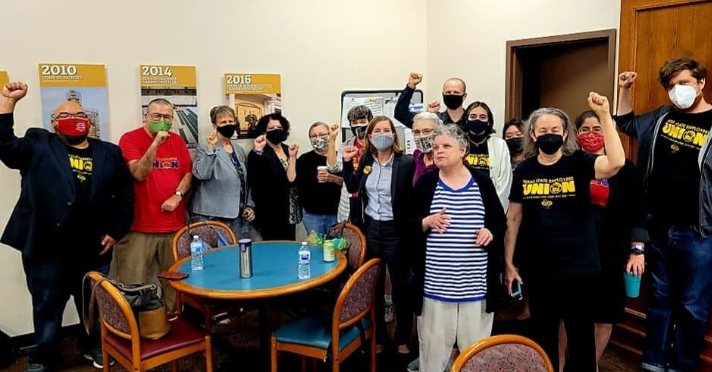
As the 87th Legislative Session began, TSEU and other state employee organizations were hopeful that the legislature would fulfil their promises from 2019 and address the unfunded liability of the Employee Retirement System, (ERS,) similar to what they did with TRS. The House Pensions Committee’s Interim Report echoed that sentiment and made no mention of plan changes being on the table. As the House Appropriation and Senate Finance Committees began meeting it still seemed as though the intention was to simply increase funding to the ERS.
Senate Bill 321 “The Plan”
That all changed when The Senate Finance Committee (Chaired by North Texas Senator Jane Nelson) stripped out the increased funding that had been approved by the Article II working group. In mid-April, Republican leadership rushed to introduce and pass a huge change to the Texas Employee Retirement System (ERS) that will shortchange most future state employees. This change was in the form of Senate Bill 321, which converts ERS to a cash balance plan for new state employees (Hired after September 2022), most of whom will receive a benefit cut under this system. Senator Joan Huffman authored this bill in the Senate, with Senators Bettencourt, Nelson, Springer, and Perry co-authoring. Sen. Huffman framed this bill as a logical adjustment to the state employee retirement plan and said that SB 321 was necessary to strengthen ERS, which is currently underfunded. In addition to the cash balance transformation, the bill also included $350 million in increased annual funding for ERS, which would have gotten the fund to a “tread water” level, but was still far from TSEU’s goal of fully funding ERS within 31 years.
Concessions
With initial pressure campaigns Sen. Huffman offered to increase the funding to $510 million with an amendment to make the bill more appealing. It is important to note that the $510 million in increased ERS funding should have been handled separately from the cash balance proposal. Tying increased funding to an overhaul of ERS was unnecessary, and was viewed as disingenuous by TSEU and our labor allies. The lawmakers behind SB 321 hoped to pass it quickly and smoothly. They sought support from Democrats to make the cash balance plan seem like a reasonable policy change with bipartisan support. The increased funding for ERS was intended to sweeten the deal and make state employees supportive of SB 321, even though it shortchanges future employees. Some organizations, like the Texas Public Employees Association and AFSCME Texas Retirees, supported SB 321 because the bill included increased funding for ERS. However, TSEU members were not willing to settle for a plan that would sell out future employees.
TSEU Push-Back!
TSEU members voiced concerns that they wanted strong public services and good state jobs not just for themselves, but for the next generation of workers too. For this reason, TSEU strongly opposed the cash balance proposal in SB 321. A letter writing, and phone call mobilization took place building up to committee hearings. TSEU and its allies were successful in generating over 20,000 emails to Representatives and Senators. This mobilization proceeded in filling up voicemails, and inboxes of Legislators. These tactics resulted in impactfully testimony, more transparency, and helped to delay a House floor vote on the bill until May 25th, which was the deadline for Senate bills to have their “second reading” vote in the House. Unfortunately, the bill passed at 10pm, only two hours before the midnight deadline. Rep. Greg Bonnen (of League City) was the sponsor of SB 321 in the House. He and Senator Huffman feeling the heat, pushed to suspend the rules and rushed the legislative process several times. It was a tough battle, but the war is far from over.
From inception to passage: SB 321 TIMELINE
- Friday, 4/16
TSEU and other organizations were briefed for the first time on the new cash balance proposal for the committee substitute of SB 321. - Monday, 4/19
Considered in Senate Finance Committee hearing at 10am. Voted out of committee on the same day. - Wednesday, 4/28:
Passed 2nd reading in the Senate, 20 to 11. Democrats Sen. Lucio, Jr. and Sen. Hinojosa voted “Yea” with the Republicans. RULES SUSPENDED to take 3rd reading vote on the same day. Passed 3rd reading. - Monday, 5/3:
Introduced in the House and referred to the House Appropriations Committee. RULES SUSPENDED to schedule it for a public hearing at 7:30am on 5/4/21. - Tuesday, 5/4:
Considered in House Appropriations Committee hearing. 22 people testified against it, 4 testified in support. Hearing started at 7:30am and resumed in the evening from about 5:30pm until 8:30pm. - Friday, 5/7:
Reported favorably from Appropriations, with 14 Republicans voting in favor and 12 Democrats voting against. - Wed, 5/19:
Sent to Calendars Committee. - Tuesday, 5/25:
Passed 2nd reading in the House with NO LAYOUT EXPLANATION AND NO DISCUSSION on a VOICE VOTE at 10pm. - Wednesday, 5/26:
Passed 3rd reading in the House after some discussion, debate, and one added amendment by Rep. Bonnen. 81 Yeas and 65 Nays. Democrats Rep. Gervin-Hawkins and Rep. Longoria voted “Yea” with the Republicans. - Saturday, 5/29:
The Senate refuses to accept the House-amended version of SB 321 and calls for a conference committee on the bill. - Saturday, 5/29:
Conference committee settles on a new version of the bill, with Bonnen’s amendment removed. Senate approves it. - Sunday, 5/30:
House Democrats walk out in protest of SB 7, the controversial “election security” bill at 10pm, preventing the House from voting on the conference committee version of SB 321. - Sunday, 5/30:
The Senate essentially rewinds the clock to vote on the House-amended version of SB 321 from 5/26. With both bodies having passed SB 321, it is headed to the Governor’s desk to be signed in to law.